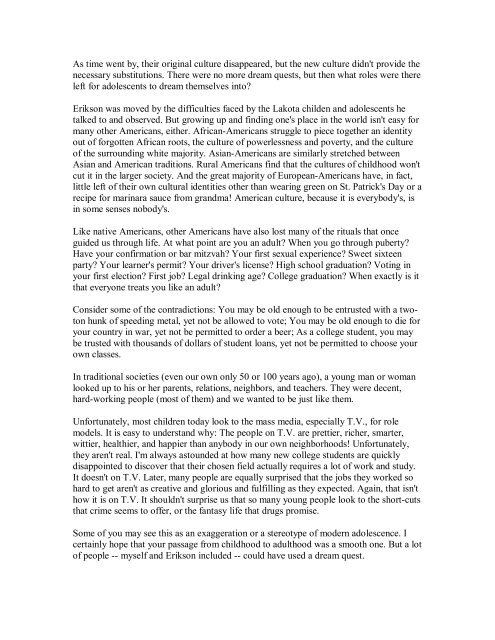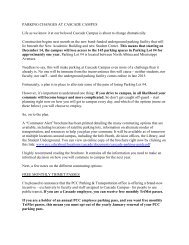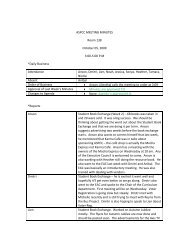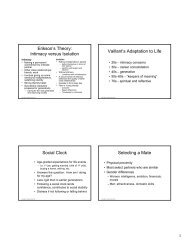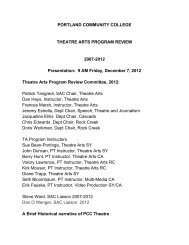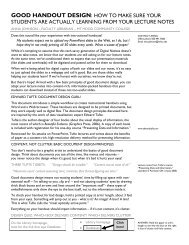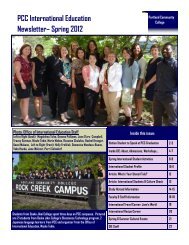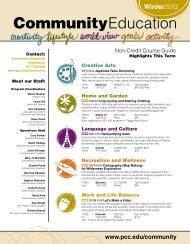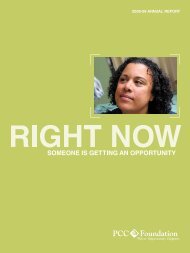erik erikson - pcc - Portland Community College
erik erikson - pcc - Portland Community College
erik erikson - pcc - Portland Community College
Create successful ePaper yourself
Turn your PDF publications into a flip-book with our unique Google optimized e-Paper software.
As time went by, their original culture disappeared, but the new culture didn't provide the<br />
necessary substitutions. There were no more dream quests, but then what roles were there<br />
left for adolescents to dream themselves into?<br />
Erikson was moved by the difficulties faced by the Lakota childen and adolescents he<br />
talked to and observed. But growing up and finding one's place in the world isn't easy for<br />
many other Americans, either. African-Americans struggle to piece together an identity<br />
out of forgotten African roots, the culture of powerlessness and poverty, and the culture<br />
of the surrounding white majority. Asian-Americans are similarly stretched between<br />
Asian and American traditions. Rural Americans find that the cultures of childhood won't<br />
cut it in the larger society. And the great majority of European-Americans have, in fact,<br />
little left of their own cultural identities other than wearing green on St. Patrick's Day or a<br />
recipe for marinara sauce from grandma! American culture, because it is everybody's, is<br />
in some senses nobody's.<br />
Like native Americans, other Americans have also lost many of the rituals that once<br />
guided us through life. At what point are you an adult? When you go through puberty?<br />
Have your confirmation or bar mitzvah? Your first sexual experience? Sweet sixteen<br />
party? Your learner's permit? Your driver's license? High school graduation? Voting in<br />
your first election? First job? Legal drinking age? <strong>College</strong> graduation? When exactly is it<br />
that everyone treats you like an adult?<br />
Consider some of the contradictions: You may be old enough to be entrusted with a twoton<br />
hunk of speeding metal, yet not be allowed to vote; You may be old enough to die for<br />
your country in war, yet not be permitted to order a beer; As a college student, you may<br />
be trusted with thousands of dollars of student loans, yet not be permitted to choose your<br />
own classes.<br />
In traditional societies (even our own only 50 or 100 years ago), a young man or woman<br />
looked up to his or her parents, relations, neighbors, and teachers. They were decent,<br />
hard-working people (most of them) and we wanted to be just like them.<br />
Unfortunately, most children today look to the mass media, especially T.V., for role<br />
models. It is easy to understand why: The people on T.V. are prettier, richer, smarter,<br />
wittier, healthier, and happier than anybody in our own neighborhoods! Unfortunately,<br />
they aren't real. I'm always astounded at how many new college students are quickly<br />
disappointed to discover that their chosen field actually requires a lot of work and study.<br />
It doesn't on T.V. Later, many people are equally surprised that the jobs they worked so<br />
hard to get aren't as creative and glorious and fulfilling as they expected. Again, that isn't<br />
how it is on T.V. It shouldn't surprise us that so many young people look to the short-cuts<br />
that crime seems to offer, or the fantasy life that drugs promise.<br />
Some of you may see this as an exaggeration or a stereotype of modern adolescence. I<br />
certainly hope that your passage from childhood to adulthood was a smooth one. But a lot<br />
of people -- myself and Erikson included -- could have used a dream quest.


